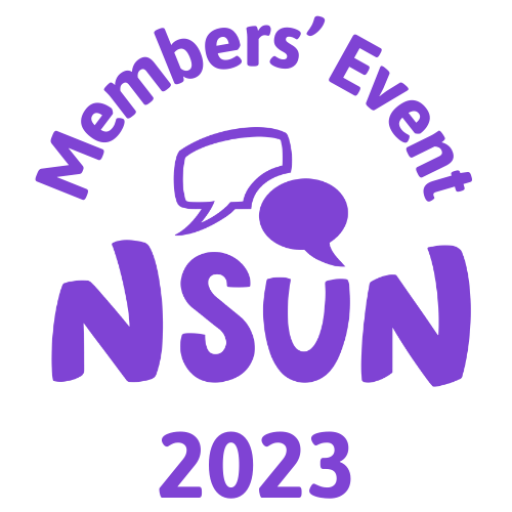This year we have four sessions taking place on Wednesday 29th November.
You can find out more and register for each session you are interested in using the buttons below. If you would prefer that we register you for sessions, please get in touch with info@nsun.org.uk with the names of the sessions you would like to sign up for and the email address you’d like us to use, along with any accessibility requirements.
After registering for the sessions of your choice, you should receive the Zoom links within a few days – do get in touch if you don’t receive your joining links (and remember to check your spam)!
We ask that attendees agree to our conduct agreement to keep the space as safe as possible for everyone.
After the sessions take place, recordings (where applicable) will be added to the pages below.
Wednesday 29th November
NSUN Business Meeting
10.00am - 10.45am
The NSUN trustees are pleased to be starting this year’s members event with a business meeting which will include a chance to meet members of the NSUN Board, a presentation of NSUN’s work over the last 12 months by members of the staff team, and an overview of the financial statements for the year ended 31st March 2023. The presentations will be followed by a chance to ask any questions you may have. The meeting will be chaired by Aimz Rushton (they/them), NSUN’s Vice Chair.
Peer support and activism: radical roots & radical futures
11:30am-12:30pm
Join us for a panel discussion about how peer support has and can continue to challenge hierarchical models of “care”, and the relationship between peer support and activism. Panelists will discuss their experiences of what changes when people have the resources and support to care for each other. We’ll also discuss how we can preserve peer support’s radical potential against co-option, and how peer support can work in activist and change-making spaces.
We will be joined by Marc Thompson (The Love Tank CIC), Lisa Archibald (Intentional Peer Support) and Anandi Ramamurthy (CHARM).
Surveillance and data sharing in mental health care
2.00pm-3.00pm
The security of sensitive data is an increasingly pressing issue in UK health care. Even after the discontinuation of the SIM (Serenity Integrated Mentoring) model of mental health care by NHS England, the collection, storage and sharing of data between the NHS, government departments and private companies remains a serious concern. For example, video monitoring system Oxevision remains in use on mental health wards and the Home Office is pushing for access to NHS records for immigration enforcement.
In a situation where invasive data collection and sharing practices are moving faster than they can be regulated, and in the context of the creeping criminalisation of distress, how can we, as people with lived experience and grassroots groups, stay on top of these developments and imagine what safer data practices might look like in mental health care?
We will be joined by Alison Faulkner (Survivor Researcher), Hat (Stop Oxevision) and Hil Aked (Medact).
Abolition and mental health with Synergi: reimagining and building alternatives
3.30-5.00pm
In recent years the term abolition has gained traction in the mainstream as a critique of prisons and policing, but what is it and how does it relate to those in user-led mental health spaces?
User-led groups are often challenging the way those experiencing mental ill health, distress and trauma are denied access to fulfilling and affirming mental health care. They also expose how people can experience harm when they do seek mental health support and can be subjected to violent encounters with the police and prison system in the process, all in the name of ‘care’.
Here, we’ll unpack how mental health care can replicate carceral systems, the historical connections between mental health institutions and prisons, and why abolition has and can provide some of the solutions to these harms. Synergi, which is hosted by NSUN, is a project that will look at mental health and racial justice through an abolitionist lens. Join us for our first public event as we explore some of the core concerns of our work.
In this discussion, we will hear about how people are bringing abolitionist principles to providing care and practical support to those experiencing mental ill-health, distress and trauma. There will be space to discuss and ask questions to our guests.
We will be joined by Jerome Sewell (Therapeutic productions CIC), Tippa Naphtali (Catalyst 4 Change CIC) and Micha Frazer-Carroll (author).

